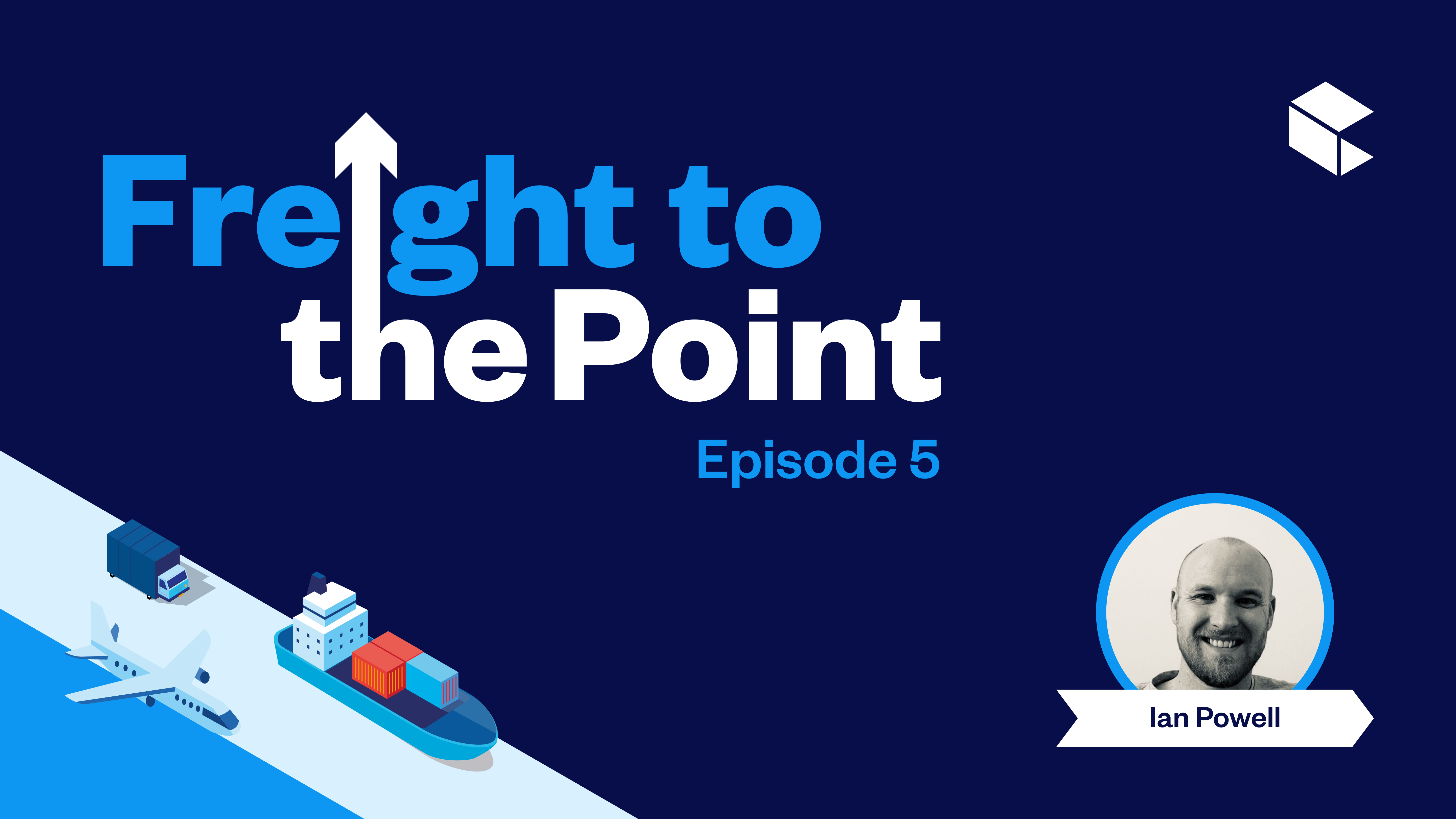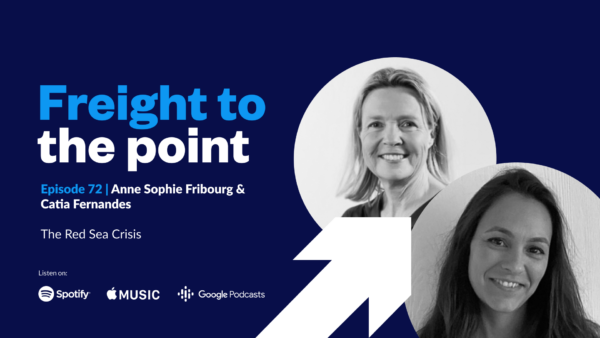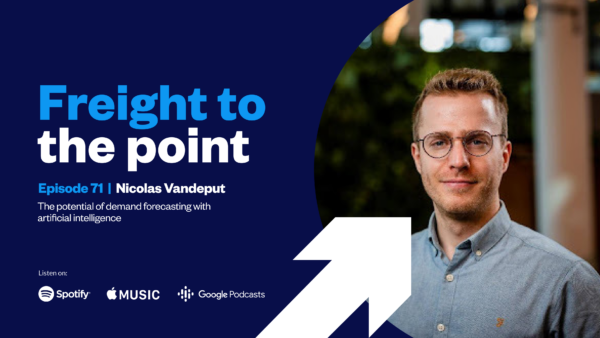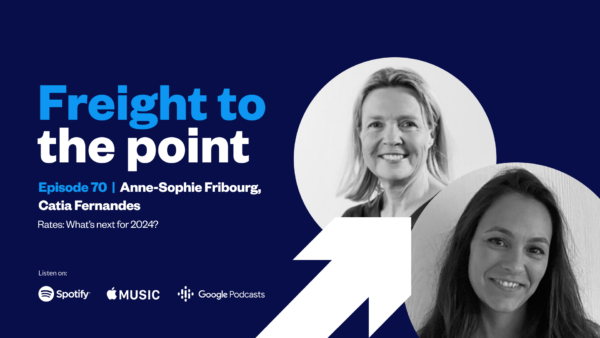Episode 5:
Developing solutions in the supply chain with Ian Powell
See all episodes

Tune into Episode 5 of Freight to the Point as Ian Powell, Head of Solutions Consulting at Zencargo, talks about some of the memorable supply chain projects he has worked on and what he thinks is key to driving disruption in the industry.
This episode discusses:
- Identifying opportunities to drive value for customers
- Developing solutions for different supply chains
- The types of projects Ian has worked on for customers while at Zencargo
Ian Powell
Ian is the Head of Solutions Consulting at Zencargo. He holds an MBA from Cranfield University and has worked in supply chain for over 20 years. At Zencargo, Ian works with prospective customers to intrinsically understand their supply chains, identify areas of opportunity and build Zencargo solutions that deliver value. He also works closely with existing customers and leverages Zencargo data to identify areas of opportunity to drive out supply chain inefficiency, optimise cost and supply chain performance. This is all in the pursuit of making the supply chain their competitive advantage.
Listen to the next episode now

Hello, and welcome to episode five of, “Freight to the Point,” a podcast by Zencargo. I’m Helena Wood, and today, I am joined by Ian Powell, the head of solutions consulting at Zencargo. Excited to have you here, Ian.

 Great to have you here. Ian, let’s get freight to the point. Tell us about your origins, and how you got into the supply chain industry.
Great to have you here. Ian, let’s get freight to the point. Tell us about your origins, and how you got into the supply chain industry.
It was more by coincidence than plan. For myself, I finished sixth form, was deciding how I was going to navigate university. I took some time, well, took two years off, to go traveling. One of the breaks between traveling was, essentially, I just had a job through a temping agency, with Volvo, supporting their operational business, planning the deliveries and scheduling of the finished goods, trucks, buses, construction, equipment, and cars. I spent a summer doing that. Then went off traveling for a bit, and came back to it. As part of coming back, I’d also decided to study whilst I was working. That gave me an opportunity to work, as well as complete my degree. I was offered a job at permanent, or full-time job, at Volvo.

 Amazing. I can see at least five very formal looking certificates behind you, on the wall, as you talk about your experience and your studying. What was the academic journey for you? You mentioned a degree, but I imagine you’ve probably done other qualifications since then.
Amazing. I can see at least five very formal looking certificates behind you, on the wall, as you talk about your experience and your studying. What was the academic journey for you? You mentioned a degree, but I imagine you’ve probably done other qualifications since then.

 It’s a very impressive track history. Do you enjoy pairing education with work?
It’s a very impressive track history. Do you enjoy pairing education with work?

 Almost certainly. I think it’s a good example of how, firstly, a resonance that lots of us don’t know what we want to do, and still end up in careers that we find hyper rewarding. Also, that having a good degree under your belt can help you go in lots of different directions, even though you might not be sitting in a legal office right now.
Almost certainly. I think it’s a good example of how, firstly, a resonance that lots of us don’t know what we want to do, and still end up in careers that we find hyper rewarding. Also, that having a good degree under your belt can help you go in lots of different directions, even though you might not be sitting in a legal office right now.

 Let’s hope so because my art history degree’s not helping me out much in supply chain.
Let’s hope so because my art history degree’s not helping me out much in supply chain.

 Of course, I do. Let’s keep going with that trajectory of your career. We’re talking about Volvo, and you had a long stint at Volvo, and then, was it Kuehne+Nagel that you went on to next?
Of course, I do. Let’s keep going with that trajectory of your career. We’re talking about Volvo, and you had a long stint at Volvo, and then, was it Kuehne+Nagel that you went on to next?

 Ian, for anyone that’s listening, that doesn’t necessarily know what we mean when we talk about solutions, can you tell us a bit about what solutions within the supply chain space actually means, and what a day in the life looks like?
Ian, for anyone that’s listening, that doesn’t necessarily know what we mean when we talk about solutions, can you tell us a bit about what solutions within the supply chain space actually means, and what a day in the life looks like?
Invariably, it’s just about understanding customers’ challenges, pain points, and issues, and how you can then tailor, essentially, a solution which could include service delivery. It could include technology, physical logistics, and executional logistics services to, essentially, overcome those challenges and problems. I think a day in the life varies quite significantly. There’s a lot of fact finding behind really understanding the customer’s challenges. That fact finding can be workshops, it can be as-is sessions. It could be having strategic alignment sessions with the customer, to understand, essentially, what they want to achieve in their supply chain. And then, it’s really dissecting that back and saying, “What enablers do you need to be able to meet those objectives? What challenges are you having in your current supply chain, and how do we build a solution to overcome all of those things?”.

 That sounds really interesting, and such a complex role, in a way. But, I suppose the real art for you in solutions is around taking something complex, and reworking it into something that is in its simplest and most effective possible output or end point.
That sounds really interesting, and such a complex role, in a way. But, I suppose the real art for you in solutions is around taking something complex, and reworking it into something that is in its simplest and most effective possible output or end point.

 What was it about the solutions consulting space that appealed to you, and that took you into this part of your journey?
What was it about the solutions consulting space that appealed to you, and that took you into this part of your journey?

 I love that, the sense of the challenge.
I love that, the sense of the challenge.

 Do you have any particular projects that you’ve worked on that have been memorable, or particularly satisfying to be part of?
Do you have any particular projects that you’ve worked on that have been memorable, or particularly satisfying to be part of?
There’s two I can think of immediately, and one during my time in Volvo. There’s many I can think of, but one during my time in Volvo was I spent nearly four years in India. At that time, Volvo set up a joint venture with Isha. One of the projects within that joint venture was to start a new medium-duty application engine plant in Pithampur, India. That was a Greenfield type, so it was a whole new production facility. It was, essentially, producing medium-duty application engines for the Asia market, but also producing what we call the base engine for the European market. It was sending the base engine into Lyon, France, for final assembly, whilst also providing finished engines to different Volvo plants and Eicher plants around the Asia region.
The exciting bit about that was it was completely Greenfield. It came together a team of different competence, from Volvo and from Eicher. I would say, it’s quite an eye opening project for me. Worked with different cultures, crossed cultural boundaries, because we had, essentially, people from Volvo who worked in France, Sweden, the UK, Belgium, versus people working in India for the joint venture, and merging those multiple cultures together for a project team to deliver, essentially, what was quite a big structural project over a four year period. It was pretty interesting.

 Gosh, that’s so fascinating for so many reasons. Firstly, all I can imagine is just at the end of the four years how satisfying it must have been to kind of go from nothing to something so sophisticated.
Gosh, that’s so fascinating for so many reasons. Firstly, all I can imagine is just at the end of the four years how satisfying it must have been to kind of go from nothing to something so sophisticated.

 I bet you had loads of fun while you were out in India for four years with that crew.
I bet you had loads of fun while you were out in India for four years with that crew.

 So let’s go on to Zencargo. You’ve now been with Zencargo just over a year. Tell us a little bit about some of the solutions that you’ve worked on at Zencargo.
So let’s go on to Zencargo. You’ve now been with Zencargo just over a year. Tell us a little bit about some of the solutions that you’ve worked on at Zencargo.
Yeah. My role initially was on presales, right? So supporting the BDMs, the BDS to drive business development managers and business development directors to drive solutions for customers or prospective customers. It’s end cargo a lot of our values driven through the platform. Certainly some of the benefits that we drive through the platform is obviously efficiency, optimization at resources.
We’re adding a technology layer into the customer’s organization where they gain a huge amount of visibility through our platform of their inbound supply chain. It’s really focused on the value levers that essentially return ROI for customers. Through my tenure in Zencargo, we’ve also then developed a post-sale support function. This is really working on those projects that drive lifetime value for our customers, right?
So yes, we may have implemented the technology with their freight forwarder of choice. We’re doing their executional logistics, but the reality is that throughout time we can identify areas of opportunity to drive further value for our customers. Data’s a key component to that, so some things we’re doing for customers, we’re looking at how do we optimize their container utilization and fill rates. How do we look at optimizing that? Should we say their network?
So that could be, port rationalization, a lot of our customers are sourcing from predominantly China and Asia, but how do we rationalize their port usage to drive container utilization and fill? It could be more specific projects. It could just be moving to purchase order management level visibility if we were just doing freight level visibility.
All of that allows us to drive additional value in terms of visibility and customers, knowing what their inbound delivery scheduling is, what products they got on time, what their intake planning should look like. It’s pretty broad, it’s technology driven. It’s also executional logistics driven and there’s probably a vast number of projects we’re working on at any one point as well as additional projects we’re trying to drive for the customer. It’s about finding new areas of opportunity that we can drive value.
One of the other areas I’ve been quite heavily involved in is obviously the release and the launch of our sustainability offering with sustainability kind, being a big thing in supply chain. It’s a big thing in general, we’ve launched that obviously sustainability offering that’s really reporting and measuring on.

 It’s interesting because obviously you talk about the fact that we’ve got lots of different customers and when you come to have conversations about optimization, there’s kind of so many different directions that you can go in and so many problems to solve and so many clickable solutions.
It’s interesting because obviously you talk about the fact that we’ve got lots of different customers and when you come to have conversations about optimization, there’s kind of so many different directions that you can go in and so many problems to solve and so many clickable solutions.
If we look at it on the kind of macro level, right? It is about visibility more often than that, it’s about getting more insights to what’s happening in your supply chain. I think historically it’s been very much customers are raising purchase orders to either their suppliers, their manufacturers, and then there’s this black hole of sorts.
Where there’s a lack of transparency, a lack of visibility within that kind of upstream activity for our customers to really have sight of, and then make decisions that might be required to be made if they had more visibility. I think that’s a big component. I think part of it’s also to do with the tracking and the visibility of all of that material through their supply chain. I think historically what’s happened is stuff’s just moved and we’ve all experienced quite a huge amount of kind of chaos the last couple of years.
That makes it ever more important and increasingly important to have that visibility. I think that’s the key topic that comes up. Then on top of that, it’s about how do you also drive value out of the supply chain. So how not only do you have now the visibility and you have the data and you have the capability to make decisions.
Supply chain is a big cost for our customers in terms of our ability to service their end customers. It’s about how do you try and support them to optimize that logistics spend or that total land cost of their supply chain, right? Because everything’s really driven by your bottom line margins on products. It’s about doing things that also support our customers to be, should we say efficient? There’s a lot of trade offs.
I think it’s not always a one size fits all. There’s a number of different value levers we can look at depending on mode of transport, depending on how they source their product, what origins they’re sourcing from. I suppose what you look at from a solutions point-of-view is very unique to the customer specific circumstances. I think those are the two core areas. It’s about visibility supported to like a digital platform. It’s also about how do we optimise the supply chain and the cost and our total landing cost of products to our end consumers.

 It makes a lot of sense. I can imagine there might be people listening who are really thinking about what that might mean for their business because of end outcomes from that. If we think about business outcomes can be actually just so impactful on whether it’s the bottom line or whether it’s really hitting that customer promise. There’s so much scope there.
It makes a lot of sense. I can imagine there might be people listening who are really thinking about what that might mean for their business because of end outcomes from that. If we think about business outcomes can be actually just so impactful on whether it’s the bottom line or whether it’s really hitting that customer promise. There’s so much scope there.
Let’s talk a little bit about disruption. One of the things we talk about a lot on this podcast is that our speakers tend to all share the recognition that the supply chain space not only has experienced massive change in the last few years. The pandemic breaks it for us locally in the UK, it has in many ways accelerated change that was possibly coming.
I’d love to hear from you what you think is key to driving disruption in the supply chain industry. I’d love to hear your kind of vision of where you’d love to see change.
I think the last couple of years there’s been a lot of force change, right? Because of the circumstances you’ve kind of described there. I think for me, where I’d like to see disruption, right, is about having the possibility or the capability to see kind of your supply chain across multiple functions of the business.
There’s still, in many respects, there’s still like a disconnect between different functions. Supply chain is more holistic now than it’s ever been, right? When I first started, we were talking to things about logistics management and it was really focused on typically the reverse and forward logistics flows of goods. I think it’s become a much more all encompassing playing field now with supply chain, right? It’s span across multiple functions, activities and different parties in, I suppose, modern supply chains, which are generally global.

 It’s exciting to think about where we’re going to get to is tech really does increase that disruption. We’re already seeing so much change, right? Ian, thank you so much. You’ve shared some really fantastic insight and I’ve loved listening to your journey, solutions, and what that means for the customers you’re working with.
It’s exciting to think about where we’re going to get to is tech really does increase that disruption. We’re already seeing so much change, right? Ian, thank you so much. You’ve shared some really fantastic insight and I’ve loved listening to your journey, solutions, and what that means for the customers you’re working with.

 Some edge of your seat stuff. Ian, tell us, if you could work for any supply chain company in any job, what would you do for a day?
Some edge of your seat stuff. Ian, tell us, if you could work for any supply chain company in any job, what would you do for a day?

 I think that would be fascinating. Ian, would you recommend that someone think about trying to make sure their supply chain is agile or resilient?
I think that would be fascinating. Ian, would you recommend that someone think about trying to make sure their supply chain is agile or resilient?

 Perfect. What’s the best piece of advice you’ve been given while working in the industry?
Perfect. What’s the best piece of advice you’ve been given while working in the industry?

 Love that. Final question, can you give us three words to describe the current market of supply chain right now?
Love that. Final question, can you give us three words to describe the current market of supply chain right now?

 Well, I’ll allow you that. We’ll forgive you.
Well, I’ll allow you that. We’ll forgive you.

 Not at all. Thank you to our fantastic audience for tuning into this episode. If anyone has any questions or feedback, please do feel free to contact us on LinkedIn. We would love to hear from you, but for now, goodbye.
Not at all. Thank you to our fantastic audience for tuning into this episode. If anyone has any questions or feedback, please do feel free to contact us on LinkedIn. We would love to hear from you, but for now, goodbye.

Episode 72: The Red Sea Crisis
In the latest episode of Freight to the Point, we’ve featured our most rec...

Episode 71: The potential of demand forecasting with artificial intelligence
In the most recent instalment of Freight to the Point, Lucie Phillips, Zen...

Episode 70: Rates: What's next for 2024?
As we prepare for the year ahead, it's crucial to consider the three pillars...

